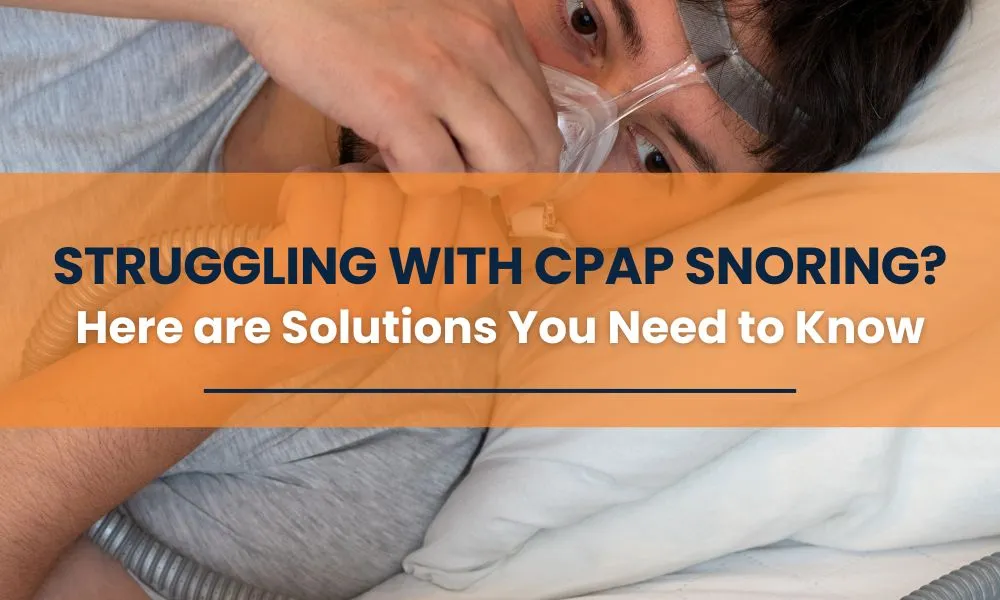Continuous Positive Airway Pressure (CPAP) therapy stands as a cornerstone in the management of obstructive sleep apnoea, a condition where the throat muscles intermittently relax and block the airway during sleep. By delivering a steady stream of pressurised air through a mask, CPAP machines help keep the airway open, thereby alleviating the symptoms of sleep apnoea, which include snoring, disrupted sleep, and the consequent daytime fatigue.
Despite its effectiveness, a significant number of users report experiencing snoring problems with CPAP machines. This puzzling situation, where snoring continues even with therapy designed to prevent it, often leads to confusion and frustration among individuals seeking a solution to their sleep disturbances. The persistence of snoring while on CPAP therapy can undermine the treatment’s effectiveness, affecting the user’s sleep quality and overall health.
Several factors contribute to this issue, ranging from improper CPAP pressure settings and ill-fitting masks to physical conditions like nasal congestion or the user’s sleep position. Recognising and understanding these underlying causes is crucial for addressing the problem effectively. As snoring can persist or even be aggravated by CPAP use in certain scenarios, it becomes imperative to explore targeted solutions that tackle these specific challenges. This exploration is not just about enhancing the quality of sleep but also about ensuring that the therapy fulfils its intended purpose of improving the well-being of individuals with sleep apnoea.
Understanding CPAP Snoring
Snoring while using a CPAP machine can be a perplexing and frustrating experience for many. Several factors contribute to this issue. Some of these factors include improper machine settings, mask fit issues, and personal health conditions. An incorrect CPAP pressure setting, either too high or too low, can fail to prevent airway collapse or cause turbulence in the throat, leading to snoring.
Additionally, a mask that does not fit well can allow air leaks, reducing the effectiveness of the therapy and contributing to noise. Physical conditions such as nasal congestion or anatomical abnormalities can also exacerbate snoring, despite the use of CPAP.
Snoring problems with CPAP therapy can significantly impact the quality of sleep. Not only does it potentially reduce the effectiveness of sleep apnoea treatment, but it can also disrupt the sleep of the user and their partner. This diminished sleep quality can lead to daytime tiredness and fatigue, negating some of the core benefits that CPAP therapy aims to provide. Moreover, persistent snoring may indicate that sleep apnoea is not being fully managed, leaving individuals at risk for the associated health complications of untreated sleep apnoea, such as high blood pressure, heart disease, and impaired cognitive function.
Recognising these underlying causes and their impact on treatment effectiveness is crucial. It sets the stage for exploring tailored solutions to mitigate CPAP snoring, ensuring that individuals can achieve the restorative sleep necessary for optimal health and well-being.
Solutions to Combat CPAP Snoring
Finding the right solutions to combat CPAP snoring can make a significant difference in the effectiveness of sleep apnoea treatment and the quality of rest you achieve. One of the primary steps is adjusting CPAP pressure settings. It’s essential to ensure that the pressure is optimised for your specific needs, as incorrect pressure levels can either be ineffective or exacerbate snoring. This adjustment should be made under the guidance of a sleep specialist or a trained CPAP technician.
Equally important is the choice of mask. Different mask styles and sizes cater to varying facial structures and sleep positions. If your mask is leaky or does not fit properly, it can lead to air escape, which may cause snoring. Trying out different masks to find the perfect fit can help alleviate this problem.
Nasal congestion remedies are also beneficial in addressing CPAP snoring. Congestion can hinder airflow, making it difficult for the CPAP therapy to work effectively. Over-the-counter nasal sprays, humidifiers, or even CPAP machines with built-in humidification systems can help reduce congestion and improve air passage.
Positional therapy options can offer solutions for those who primarily snore while sleeping on their back. Special pillows or devices that encourage side sleeping can help reduce the likelihood of airway collapse and snoring.
In more rare cases where these interventions do not yield the desired results, considering surgical interventions might be necessary. Procedures such as uvulopalatopharyngoplasty (UPPP) or nasal surgeries can address anatomical issues that contribute to snoring, offering a more permanent solution.
Exploring these various avenues, often in combination, can significantly improve the situation for those struggling with CPAP snoring, enhancing both sleep quality and overall treatment success.
Lifestyle Changes to Reduce CPAP Snoring
Adopting a holistic approach towards managing CPAP machine snoring encompasses more than just equipment adjustments; it also involves embracing lifestyle modifications that support better sleep health.
A critical aspect of this approach is weight management and adhering to a healthy diet. Excess weight, particularly around the neck, can exert additional pressure on the airway, increasing the likelihood of snoring even when using a CPAP machine. A balanced diet, rich in nutrients, can aid in weight loss and overall health improvement, potentially reducing snoring severity.
Another significant lifestyle adjustment is the avoidance of alcohol and sedatives before bedtime. These substances can relax the muscles in the throat, leading to increased airway obstruction and snoring. Their impact might compromise the effectiveness of CPAP therapy, thereby disrupting sleep quality further.
In addition, establishing a regular sleep schedule plays a pivotal role in enhancing the quality of sleep. Going to bed and waking up at the same time every day helps regulate the body’s internal clock, leading to more restful and uninterrupted sleep. This regularity can improve the effectiveness of CPAP therapy in managing sleep apnoea symptoms.
Lastly, practising good sleep hygiene is essential. This includes maintaining a comfortable, quiet, and dark sleep environment, limiting exposure to screens before bedtime, and engaging in relaxing activities as part of a bedtime routine. These practices, combined with CPAP therapy, can significantly contribute to reducing snoring and enhancing sleep quality, underscoring the importance of a comprehensive approach to managing sleep apnoea.
Seeking Professional Guidance
Navigating the complexities of CPAP snoring requires more than just a DIY approach; it necessitates the involvement of professionals who understand the nuances of sleep-related disorders. Consulting with a sleep specialist is an invaluable step for individuals experiencing persistent snoring despite CPAP therapy. These experts can conduct comprehensive evaluations, including sleep studies, to pinpoint the specific reasons behind your snoring and recommend adjustments or additional treatments tailored to your condition.
Equally critical is the role of CPAP clinics, which offer a wealth of knowledge and resources for those seeking to optimise their CPAP therapy. A visit to such a clinic can provide you with personalised recommendations, ensuring that your CPAP device and accessories, like masks and humidifiers, are perfectly suited to your needs. The trained technicians and sleep therapists at these clinics can also offer guidance on proper mask fitting and maintenance, helping to minimise leakage and discomfort, two common culprits behind CPAP snoring.
For some, traditional CPAP therapy may not fully resolve their snoring or sleep apnoea symptoms. In these cases, exploring alternative therapies can be a prudent course of action.
Options such as oral appliance therapy, positional therapy, and even certain surgical interventions may offer relief when conventional methods fall short. A multidisciplinary team, including your sleep specialist and CPAP clinic professionals, can assist in navigating these alternatives, ensuring that you are informed about all possible avenues to improve your sleep health and overall well-being.
Addressing snoring issues when using a CPAP device is crucial not only for enhancing sleep quality but also for safeguarding overall health. Continuous Positive Airway Pressure therapy, although highly effective for treating obstructive sleep apnoea, may not fully resolve snoring for everyone. Persistent snoring can lead to fragmented sleep, daytime fatigue, and can diminish the overall benefits of CPAP therapy. It’s imperative to understand that snoring is not just a nuisance but a health concern that can exacerbate or indicate underlying issues within the scope of sleep apnoea treatment.
To tackle CPAP snoring effectively, it’s essential to remain open to a range of solutions and to seek professional advice tailored to your specific needs. Whether it’s adjusting CPAP settings, exploring different mask options, making lifestyle changes, or considering alternative therapies, each step brings you closer to achieving restful, uninterrupted sleep. Engaging with sleep specialists and visiting CPAP clinics for personalised recommendations can provide insights and adjustments that DIY efforts might miss.
Remember, the journey to optimal sleep health is a collaborative process that involves exploring various strategies and leveraging professional expertise. By actively addressing CPAP snoring, you lay the foundation for improved sleep quality and, by extension, enhanced overall well-being. Your efforts towards resolving snoring contribute to maximising the effectiveness of your sleep apnoea treatment, ensuring that you enjoy the restorative sleep necessary for a healthy, active life.
If CPAP therapy snoring interrupts your sleep, look no further than choosing Rockingham CPAP.
Our professional and dedicated team, closely allied with local GPs and sleep specialists, are devoted to providing you with unique CPAP snoring solutions, while creating a personalised treatment experience.
We take pride in our complete support, coupled with advanced solutions, all focused towards improving your sleep quality and overall wellbeing. Allow us to guide you on your journey towards peaceful nights and rejuvenating sleep with Rockingham CPAP today.
Our promise is to steer you towards efficient snoring remedies and an enhanced sleep experience. Call our friendly team on (08) 6186 6636 and experience the difference a good night’s sleep can give you!

